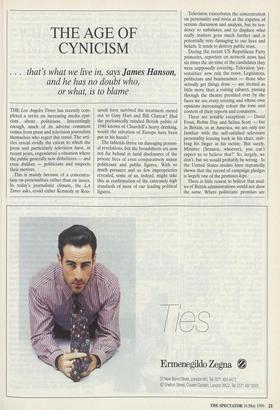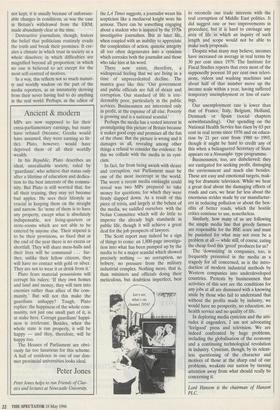THE AGE OF CYNICISM
. . . that's what we live in, says James Hanson,
and he has no doubt who, or what, is to blame
THE Los Angeles Times has recently com- pleted a series on increasing media cyni- cism about politicians. Interestingly enough, much of its adverse comment comes from press and television journalists themselves who regret this trend. The arti- cles reveal vividly the extent to which the press and particularly television have, in recent years, engendered a situation where the public generally now disbelieves — and even dislikes — politicians and suspects their motives.
This is mainly because of a concentra- tion on personalities rather than on issues. In today's journalistic climate, the LA Times asks, could either Kennedy or Roo- sevelt have survived the treatment meted out to Gary Hart and Bill Clinton? Had the puritanically minded British public of 1940 known of Churchill's heavy drinking, would the salvation of Europe have been put in his hands?
The tabloids thrive on damaging person- al revelations, but the broadsheets are now not far behind in lurid disclosures of the private lives of even comparatively minor politicians and public figures. With so much pressure and so few improprieties revealed, some of us, indeed, might take this as confirmation of the extremely high standards of most of our leading political figures. Television exacerbates the concentration on personality and trivia at the expense of serious discussion and analysis, but its ten- dency to unbalance and to displace what really matters goes much further and is potentially very damaging to our lives and beliefs. It tends to destroy public trust.
During the recent US Republican Party primaries, reporters on network news had six times the air-time of the candidates they were supposedly covering. Television 'per- sonalities' now rule the roost. Legislators, politicians and businessmen — those who actually get things done — are treated as little more than a visiting cabaret, passing through the theatre presided over by the faces we see every evening and whose own opinions increasingly colour the tone and content of their reports and comments.
There are notable exceptions — David Frost, Robin Day and Selina Scott — but in Britain, as in America, we are only too familiar with the self-satisfied television personality leaning back in his chair, stab- bing his finger at his victim: 'But surely, Minister (Senator, whoever), you can't expect us to believe that?' So, largely, we don't, but we would probably be wrong. In the United States studies have repeatedly shown that the record of campaign pledges is largely one of the promises kept.
There is little reason to believe that stud- ies of British administrations would not show the same. Where politicians' promises are not kept, it is usually because of unforesee- able changes in conditions, as was the case in Britain's withdrawal from the ERM, made abundantly clear at the time.
Destructive journalism, though, fosters the belief that politicians routinely evade the truth and break their promises. It cre- ates a climate in which trust in society as a whole dissolves; in which difficulties are magnified beyond all proportion; in which no one is believed to act except for the most self-centred of motives.
In a way, this reflects not so much maturi- ty and worldly wisdom on the part of the media reporters, as an immaturity deriving from their never having had to do anything in the real world. Perhaps, as the editor of the LA Times suggests, a journalist wears his scepticism like a mediaeval knight wore his armour. There can be something engaging about a student who is inspired by the 1970s investigative journalism. But in later life, when coupled with an inability to appreciate the complexities of action, quixotic integrity all too often degenerates into a cynicism which corrodes both the journalist and those who take him at his word.
There now exists, therefore, a widespread feeling that we are living in a time of unprecedented decline. The mantra goes like this: 'Our government and public officials are full of sleaze and corruption. Our standard of life is irre- deemably poor, particularly in the public services. Businessmen are interested only in profit, at the expense of all else. Poverty is growing and is a national scandal.'
Perhaps the media has a vested interest in promulgating this picture of Britain because it makes good copy and promises all the fun of the chase. But the picture is wrong and it damages us all, revealing among other things a refusal to consider the evidence. In this we collude with the media in its cyni- cism.
In fact, far from being awash with sleaze and corruption, our Parliament must be one of the most incorrupt in the world. The worst a recent media onslaught could reveal was two MPs prepared to take money for questions, for which they were firmly slapped down. As a result of this piece of trivia, and largely at the behest of the media, we saddled ourselves with the Nolan Committee which will do little to improve the already high standards in public life, though it will achieve a great deal for the job prospects of lawyers. The Scott report may indeed be a sign of things to come: an 1,800-page investiga- tion into what has been pumped up by the media to be a major scandal which showed precisely nothing — no corruption, no bribery, no pressure from the military industrial complex. Nothing more, that is, than ministers and officials doing their meticulous, but doubtless imperfect, best to reconcile our trade interests with the real corruption of Middle East politics. It did suggest one or two improvements in procedure, but it is hard to envisage any area of life in which an inquiry of such length and scope would not be able to make such proposals.
Despite what many may believe, incomes have increased on average in real terms by 30 per cent since 1979. The Institute for Fiscal Studies reports that even most of the supposedly poorest 10 per cent own televi- sions, videos and washing machines and about half of that number move up the income scale within a year, having suffered temporary unemployment or loss of earn- ings.
Our unemployment rate is lower than that of France, Italy, Belgium, Holland, Denmark or Spain (social chapters notwithstanding). Our spending on the National Health Service has risen by 63 per cent in real terms since 1976 and on educa- tion by 21 per cent from 1980 to 1993, though it might be hard to credit any of this when a beleaguered Secretary of State appears on a Newsnight- type programme.
Businessmen, too, are disbelieved; they are castigated for seeking profit, damaging the environment and much else besides. These are easy and emotional targets, mak- ing for dramatic television. While we hear a great deal about the damaging effects of roads and cars, we hear far less about the enormous strides made by car manufactur- ers in reducing pollution or about the ben- efits of better roads, which the hostile critics continue to use, nonetheless.
Similarly, how many of us are following the simple media line that greedy farmers are responsible for the BSE scare and must be punished for what may not even be a problem at all — while still, of course, eating the cheap food this 'greed' produces for us?
The 'downsizing' in companies, too, is frequently presented in the media as a tragedy for all concerned, as is the intro- duction of modern industrial methods by Western companies into underdeveloped countries. Protests by businessmen that activities of this sort are the conditions for any jobs at all are dismissed with a knowing smile by those who fail to understand that without the profits made by industry, we would have no prosperity, no education, no health service and no quality of life.
In deploring media cynicism and the atti- tudes it engenders, I am not advocating leelgood' press and television. We are indeed confronted by huge problems, including the globalisation of the economy and a continuing technological revolution in industry. Cynicism, though, by its relent- less questioning of the character and motives of those at the sharp end of our problems, weakens our nation by turning attention away from what should really be concerning it.
Lord Hanson is the chairman of Hanson PLC.



































































 Previous page
Previous page